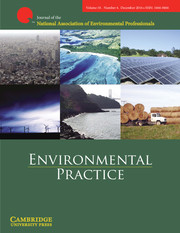No CrossRef data available.
Article contents
Commentary: Estimating Used Motor Oil Volumes Generated by Do-It-Yourself Oil Changers in Bellevue, Washington
Published online by Cambridge University Press: 13 July 2009
Abstract
Since 1993 the City of Bellevue, Washington, has managed a Closed Loop Oil Recycling and Education Program. A central aim of the program is to recover used oil generated by do-it-yourself oil changers. While collection volumes for used oil are accurately estimated, the amount of oil generated by do-it-yourselfers—and therefore available for collection—is less well known. The challenge is compounded by the unavailability of sales figures for new oil, and because considerable volumes of oil drip from, or are burned in, car engines. Additionally, estimates of do-it-yourself activity are imperfect, especially with regard to the average number of oil changes per year, and the variable oil capacity of engine crankcases. Finally, some oil volume is disposed along with used oil filters and is not recovered through do-it-yourself channels. This model and report attempt to generate a state-of-the-art methodology for determining available volumes of used do-it-yourself oil in a given jurisdiction. In this case, the City of Bellevue found that 23,642 gallons are being collected annually of an estimated 58,132 available, for a 40.7% collection rate. This rate is considerably higher than most other estimates around the country.
- Type
- Features & Reviews
- Information
- Copyright
- Copyright © National Association of Environmental Professionals 2001


